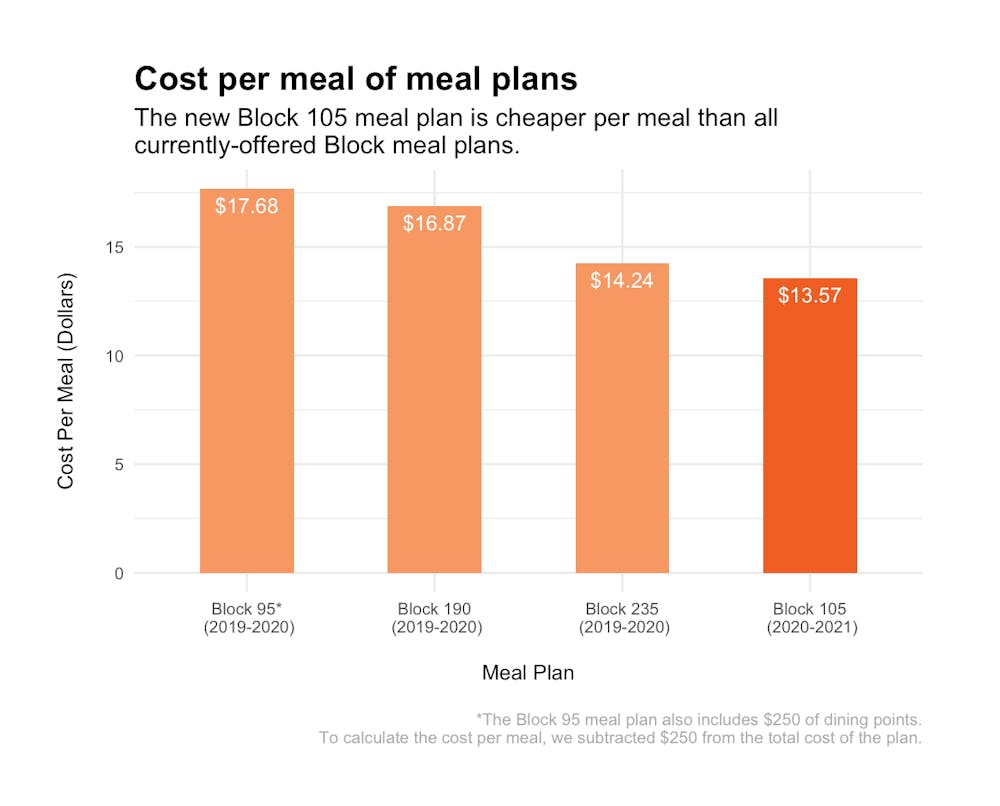Beginning next year, the University will be replacing its three offered “Block” meal plans for a single option — one that is less expensive and costs less per meal than all currently offered dining options.
Previously, three separate “Block” plans were offered to juniors, seniors, and graduate students in addition to the Unlimited plan. According to a statement, the University is doing away with all three currently offered Block plans — the Block 235, Block 190, and Block 95. Going forward, juniors and seniors will be able to choose between the Unlimited plan and a new, $2,850 Block 105 plan.
According to the statement, which was sent to all first-year students, sophomores, and juniors on Feb. 5, the change came out of “recommendations from student focus groups and surveys.”
“During a comprehensive review of meal plans, we identified an opportunity to offer greater value with a new plan,” the University Dining website notes. “The new Block 105 Plan is less expensive and offers greater per-meal value compared to any of the current block plans.”
Additionally, beginning in the 2020–2021 Academic Year, students will be able to use both the Unlimited and Block 105 plans for single-swipe entry to meals during fall and spring recess. Currently, only students on the Unlimited plan have automatic access to dining halls during these time frames.
For Wintersession, a two-week period at the end of winter break under the new academic calendar, students can sign up for meals in the residential college dining halls free of charge, no matter their meal plan.
All other associated programs, including Guest Meals, Late Meal, Lunch to Go, Meal Exchange, and Two Extra Meals, will remain intact under the new system.
Grace Masback ’21, a student on the Block 95 plan this year, said her meal plan was “kind of annoying to have.”

“I was living in a residential college, so I had to be on a meal plan, and so I chose the cheapest one,” Masback said. “It felt like an expensive investment for not that many meals.”
Currently, students pay $6,695 for the Block 235 plan, $6,410 for the Block 190 plan, or $3,610 for the Block 95 plan. Out of this group, the Block 235 plan was the cheapest on a per-meal basis — costing students approximately $14.25 per meal.
The Block 105 plan will cost about $13.57 per meal.
“If I were living in a res college again next year, I think the 105 would be a good option,” Masback said.

This change will also eliminate Dining Points, something currently offered as a part of the Block 95 plan. In addition to 95 meals, the current Block 95 plan allows students to spend an extra $250 in the dining halls, the Frist Food Gallery, and at eight other campus venues. According to University Deputy Spokesperson Mike Hotchkiss, the Dining Points were initially added to the Block 95 Plan in 2017 “to temporarily address concerns about the value of the plan.”
The Block 105 Plan is priced at $760 less than the current undergraduate Block 95 plan. For graduate students, the Block 105 Plan will cost $790 less than the current Block 95 option.
“Students can choose to apply those savings in a way that best suits their dining needs,” Hotchkiss wrote to The Daily Princetonian.
Current sophomores, juniors, and graduate students will be able to choose between the $2,850 Block 105 plan and an Unlimited meal plan, the price of which is still being determined, according to Hotchkiss.
The current Unlimited plan costs $7,060 for undergraduates and $7,090 for graduate students.
“The rate is subject to change as a result of the rate approval process that occurs in late spring. If a fee changes, then a new housing contract reflecting the revised rate will be issued,” Hotchkiss wrote.
A Shared Meal Plan will still be available to certain eating club members living in residential colleges, and that plan will be unchanged. Students with a Shared Meal Plan receive 125 total meals — 95 from their club and 30 from the University. According to Hotchkiss, there will be no changes at all to the Shared Meal Plan system.
New this year, the University will also grant a $200 reimbursement to sophomores who join a co-op or eating club in the spring semester. However, the $200 reimbursement will not be offered to juniors who join eating clubs, no matter their current meal plans.
“The $200 reimbursement recognizes that some students on the Unlimited Plan will take meals during the spring semester at co-ops or eating clubs,” Hotchkiss noted.
Former Cloister President and ICC Chairperson Meghan Slattery said the clubs are excited about this initiative.
“With this change, Street Week 2020 will grant all sophomore students additional funds that can be applied directly to sophomore spring dues resulting in a significant reduction of sophomore membership costs,” she wrote to the ‘Prince.’
Marie-Rose Sheinerman contributed to the reporting.








